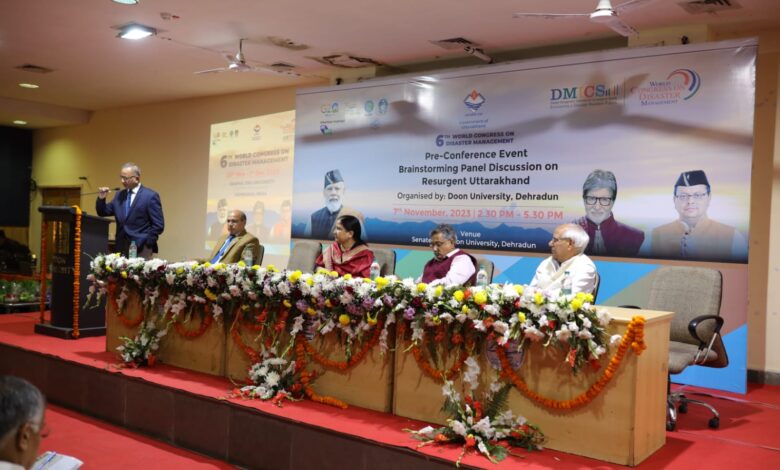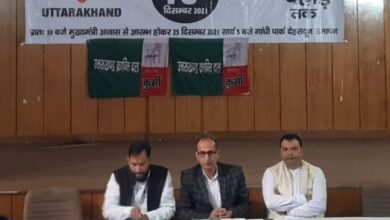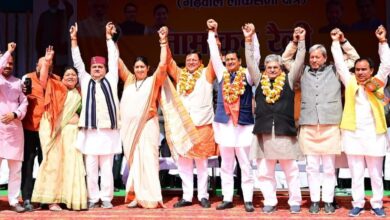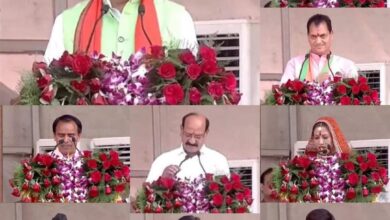Dehardun Declaration to come out at the end of Sixth World Congress on Disaster Management: Experts


Dehradun, Nov 08: Experts from a range of academic disciplines converged at Doon University as part of pre-conference to Sixth World Congress on Disaster Management to be organised here later this month and agreed to come out with a Dehradun Declaration at the end of the international meet.
Deliberating upon the pre-conference theme ‘Resurgent Uttarakhand’, they underlined the need to address the widening policy disconnect between state’s inherent geological instabilities, ever increasing vulnerabilities to natural disasters and climate change and the development strategies.
Stating that the world is facing increasing challenges from natural and man-made disasters, , Doon University Vice Chancellor Prof. Surekha Dangwal in her inaugural address emphasised on the need for a holistic approach towards development, linking together economy, ecology and ethics. Tampering with ecology for personal and physical gains can be disastrous for humanity, she said adding that ethics and morality should guide our policies.
Internationally renowned expert on Himalayan ecology, Prof. S.P. Singh delivered a comprehensive lecture on various significant aspects of Himalayan ecology, disasters and incidents of climate change. Emphasising on the need for climate justice and to bring into policy eco-system services, Professor Singh stated that Himalayan region is producing very low emissions compared to cities and plane areas and poor people contribute almost zero to carbon emissions.
Making a crisp comparison, Prof. Singh suggested that preparedness for natural disasters in the region should take a page from the playbook of Japan, which is known for its strong disaster management systems. He also highlighted the serious issue of border districts facing increase in migration due to changing climate and environmental challenges. This demographic shift raises important questions about resource allocation and resilience building in these areas. Furthermore, Professor Singh advocated for “carbon justice”. It is a concept that urges equitable distribution of the burdens and benefits associated with carbon emissions.
The convener of this pre-conference and Dean of the School of Social Sciences, Prof. R.P. Mamgain outlined the detailed theme of the conference and highlighted the need for preparing the communities towards resilience, disaster preparedness and to provide support, emergency services and trainings to the local people. Citing the example of Japan, Professor Mangain said that there is a need to develop a flexible strategy for development projects in Uttarakhand. He stressed on resilient development plans for the area at both individual and community levels so that the impacts of future incidents like the Kedarnath disaster can be mitigated. He stressed on the need for centrality of environmental protection to be integrated in all ongoing developmental projects in Uttarakhand. “The vision is to promote growth in various sectors including MSME, agriculture and others while outlining the ambitious vision of the future by 2030 with an aim to reach the last mile for the upliftment of the state,” Professor Mangain said.
In his address, Uttarakhand Council for Science and Technology (UCOST) Director General Professor Durgesh Pant emphasized on the key issues related to disasters and emphasised on the need for safe investments that can create a sustainable ecosystem. Professor Pant drew attention to the important demographic dividend that can be harnessed in the context of natural disaster preparedness and recovery efforts.
Former Doon University Vice Chancellor Professor Gajendra Singh underlined the deep sensitivity of the agricultural sector towards such disasters. He said that there is an urgent need for comprehensive strategies and preparedness measures to protect a state like Uttarakhand so as to ensure global food security.
Renowned Geologist Prof Y P Sundriyal highlighted the need for resilient structures that can withstand the devastating impact of floods. Prof. Avinash C. Joshi stressed on the critical importance of site selection for infrastructure development and advocated for small hydro projects for energy in the Himalayan region. Prof. Swapnamitra underlined the need to prepare future geologists and geotechnical experts while highlighting the importance of creating smart villages where basic amenities are easily available.
Former bureaucrat Mr Anil Bahuguna spoke about the need for a policy that maintains a balance between environmental concerns and economic growth and integrating environmental sustainability into policy decisions
Economist Prof Vinay Baurai explained the need for setting up dedicated scientific institutions focused on dealing with natural disasters. His insightful comments underlined the critical importance of proactive measures in the face of growing environmental challenges. Dr Pradeep Mehta stressed on the importance of traditional architecture, disaster-resilience, skills and cluster development as key strategies to prevent natural disasters.
Stating that tourism is an imporntanc component of development in Uttarakhand Dr. Ganjendra Singh highlighted the need for responsible tourism and sustainable practices in the travel industry to reduce the impact of natural disasters on vulnerable areas.
Moderating the conference, Management Guru Prof HC Purohit, Dean, School of Management, said that there should be policies for disaster prone and affected states which ensure participation of the general public so that practical aspects can also be included and scientific approach integrated. “It is the responsibility of the social scientist to take it from the laboratory to the common people,” Professor Purohit said.
Summing up the day-long program attended by over 200 participants, Professor Harsh Dobhal of School of Media and Mass Communication said that organizing this World Congress on Disaster Management in Dehradun will strengthen Himalaya-centric planning and a multidisciplinary approach to comprehend the complexity of the problem first and accordingly thrash out solutions. “Given the immensity of the challenges before us, there is a need to pursue interdisciplinary and multidisciplinary dialogues between the social sciences, the humanities and the hard sciences. Climate change and disasters now compel us to abandon the previous attitude of pigeon hole specializations in which the hard sciences and the social scientists pursued their research and problems separately,” Professor Dobhal said.
It was decided in the pre-conference that the Sixth World Congress on Disaster Management to be held in Dehradun later this month will come out with a comprehensive Dehradun Declaration which will bring the Himalayan region into the focus of the ongoing debates and policies.
Dr Pallavi Upreti presented the vote of thanks. Faculty members and research students of various departments participated in the programme, including Dr. Madhu Bisht, Dr. Sushant Kumar, Dr Sudhanshu Joshi, Dr Arun Kumar, Dr. Rashi Mishra, Dr. Savita Tiwari, Dr. Anshuman Mishra, Dr. Rajesh Bhatt, Dr. Sonu Kaur and others.






